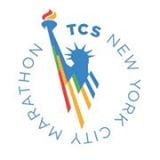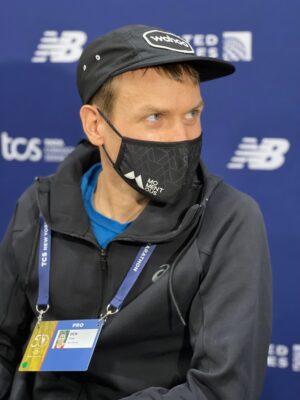Ben True & Noah Droddy Go From Unsponsored to Sponsored on the Eve of the New York City Marathon
By Jonathan Gault
November 5, 2021
On December 20, 2020, Noah Droddy ran the marathon he had been dreaming of. On a flat 4.3-mile loop on a brisk, sunny day in Chandler, Ariz., Droddy finished second at the Marathon Project, a one-off event designed to produce fast times for American marathoners. Droddy delivered, running 2:09:09 to make him the 10th-fastest American marathoner in history (record-eligible courses). It seemed like the start of something.
Six months later, that day in the desert felt more like the end. His shoe contract with Saucony, the company that had sponsored him since May 2017, had expired at the end of 2020. Droddy had thought that, after his 2:09, he would not have a problem finding a new deal.
Reality proved different. Shoe companies were interested in signing Droddy, but only on their terms. Some offered below what Droddy perceived as his market value. Others asked him to join a specific training group, which would require moving — something Droddy, who lives in Boulder with his wife Emma Kertesz (a 2:40 marathoner herself) and trains under coach Richey Hansen, was unwilling to do.
That left Droddy at a crossroads. He was 30 years old and without a sponsor. Was it worth it to train at the level of a professional when he was no longer being paid as such?
“I just wasn’t in a good place mentally,” Droddy says. “…I was having some issues with my identity and questioned what I was doing. Running was basically a hobby for me at that point because I wasn’t technically a professional runner.”
Eventually, Droddy realized he could not wallow on his couch anymore: he needed to accept his new reality and find a job.
That process proved considerably easier than finding a professional running contract. SOS Hydration already employed a handful of runners, including Garrett Heath, and Droddy had learned through connections in the Boulder running community that they were looking for a manager for their warehouse in Longmont. Droddy didn’t even have to formally apply. He just dropped by the warehouse, met with the team, and both agreed it would be a good fit. He started at the beginning of August.
And so that is how Droddy spent his preparation for Sunday’s New York City Marathon. It took a few weeks for him to adjust from crashing on a couch after a morning workout to moving boxes and pallets in a warehouse. But Droddy’s bosses are flexible, allowing him to arrive at 10 a.m. (he usually stays until 5 or 6, logging his second run after work), and he even has access to a pair of NormaTec recovery boots at the warehouse.
Droddy had financial stability. But he still didn’t know what that meant for his running career.
“There was a large percentage of this year where I had decided that New York would be my last race,” Droddy says.
He occupied a curious position. He was fast enough for the New York Road Runners to pay an appearance fee for him to compete at their race; in fact, he is the fastest American in this year’s professional field by personal best. Yet his future in the sport was totally uncertain. And he was not alone.
An even faster American also didn’t have a contract
Ben True, making marathon his debut in NYC, also entered race week without a shoe contract, despite running a personal best of 27:14 for 10,000 meters earlier this year and finishing fourth in that event at the US Olympic Trials. Like Droddy, True had been dropped by Saucony after the 2020 season. And, like Droddy, his future in the sport was totally up in the air beyond this weekend. True turns 36 next month, with a three-month-old son and a wife, Sarah, who is hoping to return to grad school. Another year of running without a contract in 2022 was not an option.
“Going after only prize money and appearance fee money,” True says, “that sort of thing works until that first injury, and then there’s nothing you can do.”
Fortunately, that scenario remains a hypothetical. On Thursday, True announced he has agreed to sponsorship with Asics that will run through the end of 2023. On the same day, Droddy announced a deal with Salomon that goes through 2024.
So what to make of all this? True chooses to see the positive — particularly when it comes to Salomon, an outdoors company that had little previous involvement in the professional road running scene.
“Hopefully it means good things,” True says. “It’s cool to see companies that are coming into the road running market. It’s always nice when you see those new companies — like On came in a couple years ago, sponsored a big group out in Boulder, they’ve done great success. So hopefully the success of those athletes and those companies show that more companies can come in. And the more companies that come in, I think it’s only better for everybody.”
The flip side: Droddy and True were two of the biggest American names in this year’s NYC field, both coming off some of the best performances of their careers, yet they entered race week without professional contracts. Last month, Nell Rojas ran 2:27:12 to finish as the top American in the Boston Marathon. She, too, is unsponsored.
“It doesn’t say anything good about the professionalism of the sport,” Droddy says.
(It also doesn’t say anything good about Saucony. Though two of the top Americans in New York — Laura Thweatt and Jared Ward — both represent Saucony, the race will also feature three notable ex-Saucony athletes: True, Droddy, and Molly Seidel, who signed with Puma after her Saucony deal was up at the end of last year. Tim Broe officially stopped coaching Saucony’s pro group, the Freedom Track Club, at the end of January, and it is unclear who is in charge of the brand’s sports marketing department.)
During his time as an unsponsored athlete, Droddy thought about the way professional running is structured in the year 2021. He saw athletes running fast times — “from a performance standpoint, the sport is healthier than it’s ever been on the track and the roads; everyone’s killing it” — yet that was not translating to an equivalent investment of sponsorship dollars (perhaps because the advent of supershoes has artificially inflated times).
Track and field, Droddy realized, does not operate like other professional sports. If you are one of the best 50 quarterbacks in the United States, you will be employed by an NFL team because the NFL values performance over image (well, unless your name is Colin Kaepernick). Being one of the top 10 marathoners in the country brings no such guarantee. Droddy, True, and Rojas are all in their 30s, lone-wolf types in a sport in which a team-based model has become more popular.
“You have to fit into the vision that a company wants for their pro running team,” Droddy says. “And to some extent, your performance is irrelevant to that. If they want young NCAA talent, I’m 31. I don’t fit into that.”
Overall, the shift to a team-based model has offered plenty of positives for the sport. It provides athletes with built-in training partners, a necessity for almost every pro (even True, who for years was the definition of a lone wolf in running, acknowledged he needed someone to train with the last few years in order to stay in the sport). And it is a more efficient model for the brands.
“The shoe companies are getting a lot of bang for their buck out of those athletes that are on those teams because the teams have giant followings and are able to amplify the individual brands of each of their athletes in a way that athletes can’t do on their own,” says Ben Rosario, who coaches one of those teams, HOKA Northern Arizona Elite.
True, however, pushes back on the notion that teams amplify an athlete’s individual brand.
“It doesn’t really matter who the individual athlete is, it’s just what the entity of the group is,” True says. “I can understand that, but I think it’s a detriment to the individual athlete. It’s just like if you’re working at a company. You can’t get high performance forcing people to go a certain way. You get high performance by allowing the individual to do what they do well — if that’s your goal.”
True had that in mind when he established his own training group, which has now been formalized into a team known as Northwoods Athletics. Comprising True, Fred Huxham, and Dan Curts (neither of whom are sponsored), Northwoods is based in Hanover, N.H., and allows True to retain his independence while capitalizing on the other benefits of the team-based model. In that way it is similar to Team Boss, the unbranded group Emma Coburn and Joe Bosshard began four years ago which has morphed into one of the country’s top training groups.
“One of our big things is we are not ever going to have a shoe company or shoe apparel sponsor for the group,” True says. “We would only take non-running-shoe apparel companies as sponsors because we want to allow the individual athletes to get their own deals and not be pigeonholed into certain groups. We want to be able to be very welcoming and be able to have anybody come join us.”
Meanwhile Droddy, after waiting months to sign a pro deal is, ironically, planning on keeping his job at the warehouse. It offers some nice benefits, notably health insurance (the first time he’s had it in a decade) and an extra stream of income. But now that he’s a professional again, he has to think about his performances. Results may not be the only thing brands value, but they still value them. If it turns out he can’t balance a full-time job with his training, Droddy may have to pivot yet again.
“Obviously the big test will be New York to see if that lifestyle actually is conducive to high-level distance running,” Droddy says.
More: MB: Noah Droddy to Salmon (sic)
*MB: Ben True is signed – Asics picks him up
*Full 2021 NYC Marathon Coverage




